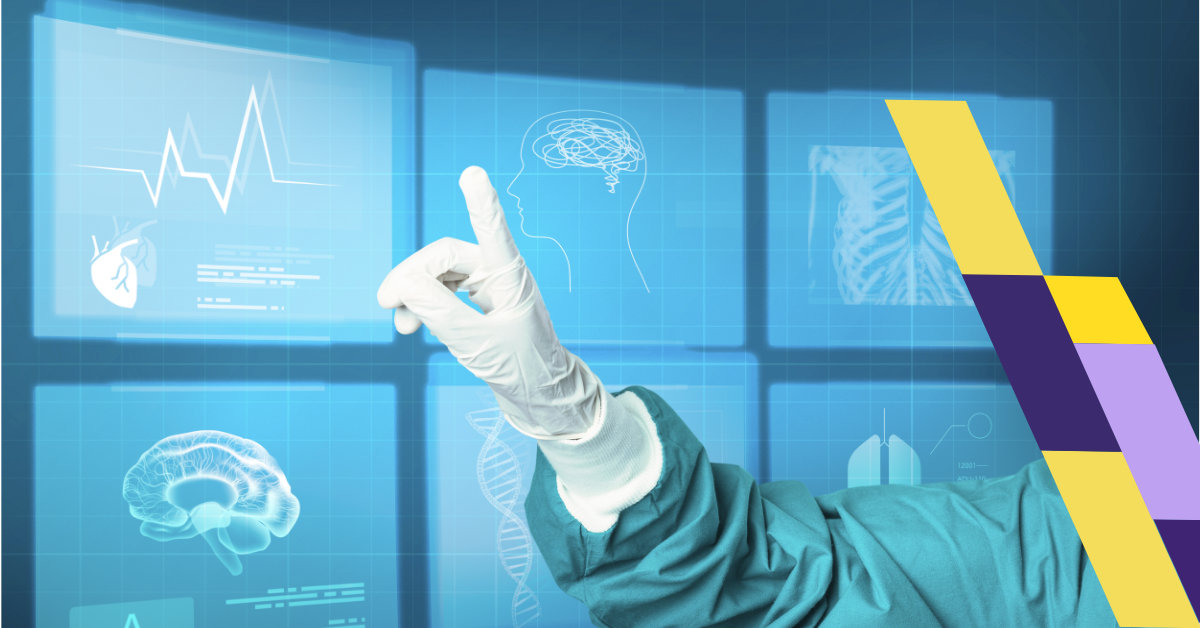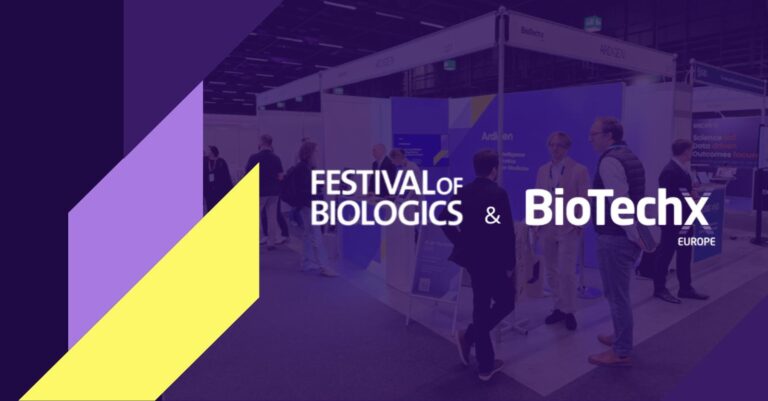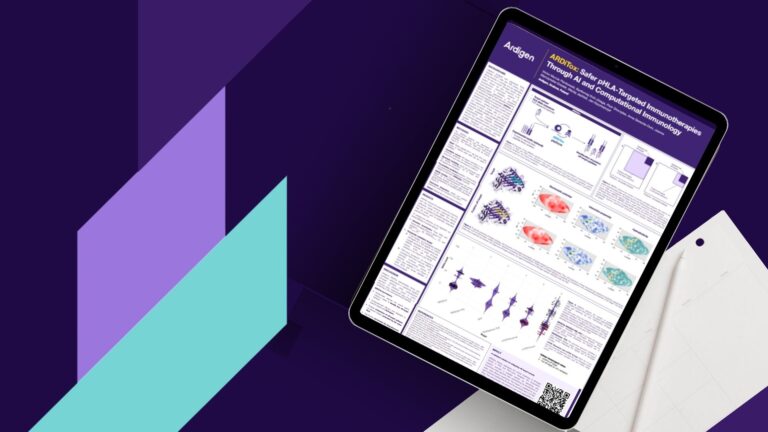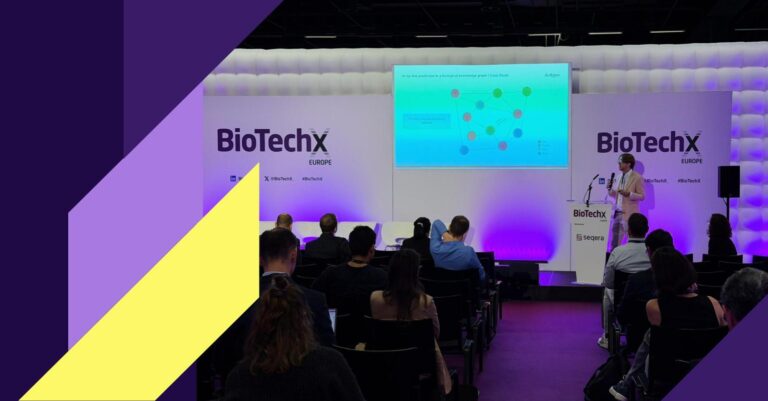This article examines how data and artificial intelligence (AI) are transforming healthcare by enabling innovative approaches to drug discovery, personalized medicine, operational efficiency and regulatory compliance. We also outline the challenges and opportunities for 2025 and beyond.
Data has become the backbone of modern healthcare, offering unprecedented opportunities for innovation and efficiency. ‘Big data’—from electronic health records (EHRs) and clinical trial results to patient-reported outcomes and wearable device metrics—could enable more accurate insights into patient populations, help monitor disease progression, and improve treatment efficacy. Yet, 97% of biological and health data is fragmented and inaccessible, according to the World Economic Forum.
Integrating insights derived from diverse data sources, including large consortia, biobank data, public repositories and internal organizational records, can help biotech and pharma companies accelerate drug discovery and speed up regulatory approvals. Data-powered predictive analytics can help identify at-risk populations and personalize treatments. Additionally, data analysis can help biotech and pharma managers optimize market strategies.
Utilizing health data effectively requires a comprehensive approach that includes grounding data-driven decisions in real-world evidence, ensuring interoperability between data science and biology teams, and maintaining data compliance with stringent privacy regulations. Ardigen’s recent partnership with Databricks exemplifies this commitment, transforming clinical data management with cutting-edge Lakehouse solutions to ensure data integrity and accessibility.
In this article, we discuss the opportunities of using AI tools such as natural language processing and machine learning to enhance the drug discovery and development process, as well as address the potential challenges that need to be overcome to ensure that these tools become a mainstay in the biotech and pharma industries.
Natural language processing for data analysis
Natural language processing (NLP) algorithms can be used to analyze large volumes of medical literature, patient records and clinical data. Medical research is published at an overwhelming rate, making it nearly impossible for clinicians or researchers to keep up. NLP algorithms can be used to extract relevant information from journal articles, clinical guidelines and research papers to help summarize findings, identify important population characteristics and even identify potential treatment avenues.
Our work, such as exploring how LLMs can enhance gene expression annotations, showcases the practical application of NLP in extracting deeper biological insights from complex textual data.
Additionally, patient records, including electronic health records (EHRs), present an untapped treasure trove of data. These types of data (including doctor’s notes, test results and imaging reports) are often unstructured, making manual analysis inefficient. NLP can streamline analysis by processing medical notes, extracting key concepts such as symptoms or diagnoses and converting them into structured formats that can be used to extract valuable insights.
Machine learning for predictive analytics and decision-making
Machine Learning (ML) plays a critical role in predictive analytics and decision-making across healthcare, enabling organizations to identify patterns in vast datasets, predict outcomes and make informed decisions in real time. ML models can analyze historical patient data, including demographics, medical history, lab results and genetic information, to predict the likelihood of developing specific diseases or complications and even flag potential risks, like early signs of sepsis, which can save patients’ lives.
For example, ML algorithms can use data from wearable devices, EHRs and lifestyle factors to predict the likelihood of heart attacks or strokes, enabling early interventions. In patients with diabetes, ML models can recommend personalized insulin dosages based on continuous glucose monitoring and lifestyle data. This brings the concept of personalized medicine, where therapies are tailored to genetic and clinical profiles, closer to reality.
Opportunities for pharma and biotech managers
The integration of data and AI into healthcare presents a range of transformative opportunities for pharma and biotech, from accelerating drug discovery and development to improving operational efficiency, regulatory compliance and streamlining clinical trials. By integrating AI-powered tools into organizations, biotech and pharma managers can reduce overhead costs while maintaining high quality standards and ensuring the timely completion of milestones.
Accelerating drug discovery and development
AI-driven platforms are revolutionizing drug discovery and development by identifying potential candidates, simulating molecular interactions and predicting efficacy more quickly and accurately than traditional methods. Machine learning models can analyze vast datasets from genomic, proteomic and chemical libraries, significantly reducing the time and cost associated with developing new drugs.
Operational efficiency is another area where AI is making a substantial impact. Predictive models can help identify weaknesses in supply chains, optimize inventory management and reduce operational costs. These advancements allow pharma and biotech managers to prioritize and optimize R&D pipelines, bringing life-saving treatments to market faster and at a lower cost.
Streamlining regulatory compliance
Additionally, AI can facilitate compliance processes and regulatory submissions for biotech and pharma companies. This complex and time-consuming task can be streamlined by automating the review and validation of complex datasets, which ensures adherence to standards such as HIPAA, GDPR and FDA guidelines. Machine learning models can analyze large-scale clinical and operational data for discrepancies, flagging potential compliance risks while generating accurate reports for audits and regulatory submissions.
Enhancing clinical trials
AI and ML can be used to enhance the clinical trial process by improving trial design, participant selection and real-time monitoring. Predictive analytics and real-world data allow researchers to identify suitable participants based on genetic, demographic and clinical characteristics while predicting trial outcomes and risks. Additionally, new research has shown the potential to reduce the trial group size with the help of AI optimization.
For example, AI can help identify underrepresented populations to improve trial diversity, which is crucial for regulatory success and broader market applicability. These tools enable pharma and biotech managers to optimize the cohort size, reduce trial dropout rates and shorten development cycles, ultimately accelerating the path to market for new therapies.
Challenges of implementing data-driven healthcare models
One significant barrier to the widespread adoption of AI in healthcare is data privacy and security concerns, as healthcare data is sensitive and subject to stringent regulations like HIPAA and GDPR. Data integration remains a struggle, as different systems and formats across organizations make it difficult to synchronize and analyze information. Additionally, the lack of skilled experts makes it harder for companies to build the necessary capabilities in-house.
To overcome these obstacles, pharma and biotech companies should invest in building interoperable systems and adopting standardized data formats can facilitate smoother integration across platforms. Companies can also address the talent gap by partnering with external experts who can provide tailored solutions to meet the evolving demands of a data-driven healthcare environment. Ardigen provides a wide range of custom solutions from data management to building custom AI and machine learning models.
Leaders like Piotr Fabijański, Director of Software Engineering at Ardigen, exemplify this commitment to overcoming complex data challenges. His expertise drives scalable data solutions and custom AI/ML models, including work on fMRI data quality assurance, to deliver actionable insights in healthcare. Find more on Piotr Fabijański’s LinkedIn.
Looking forward to 2025: AI and personalized medicine
In 2025 and beyond, the integration of data and AI tools in healthcare is poised to make medicine more accessible, personalized and effective. With the rapid cost reduction of Next-Generation Sequencing (NGS), researchers are able to tailor treatments to individual genetic profiles, improving the precision and effectiveness of diagnostics and treatments. Additionally, multi-modal data from biobanks, large consortia (such as the JUMP-CP consortium), public repositories and internal sources are becoming increasingly utilized by companies to drive innovation.
Driven by innovations in sequencing and data analysis, AI and machine learning are being used to process large-scale multi-omic datasets, identifying patterns in large-scale population data and enabling a deeper understanding of disease relationships. For example, AI can predict the disease susceptibility of certain populations or the likely response to specific treatments by analyzing the genetic profiles of specific individuals. Moreover, AI-driven tools can now integrate genetic data with lifestyle and environmental factors to develop more holistic, personalized health strategies.
2024 saw many breakthroughs at the intersection of AI, data and health, from AlphaFold 3 making protein predictions with higher accuracy than ever before to the first successes in using the computer-brain interface. As we look forward to next year, we anticipate continued progress in transforming healthcare with AI, with Ardigen leading the way alongside our partners in innovation.
Ardigen’s own research, such as AI-powered histological evaluation of Crohn’s disease, exemplifies the cutting-edge applications of AI in complex health data analysis, driving forward precision medicine.




